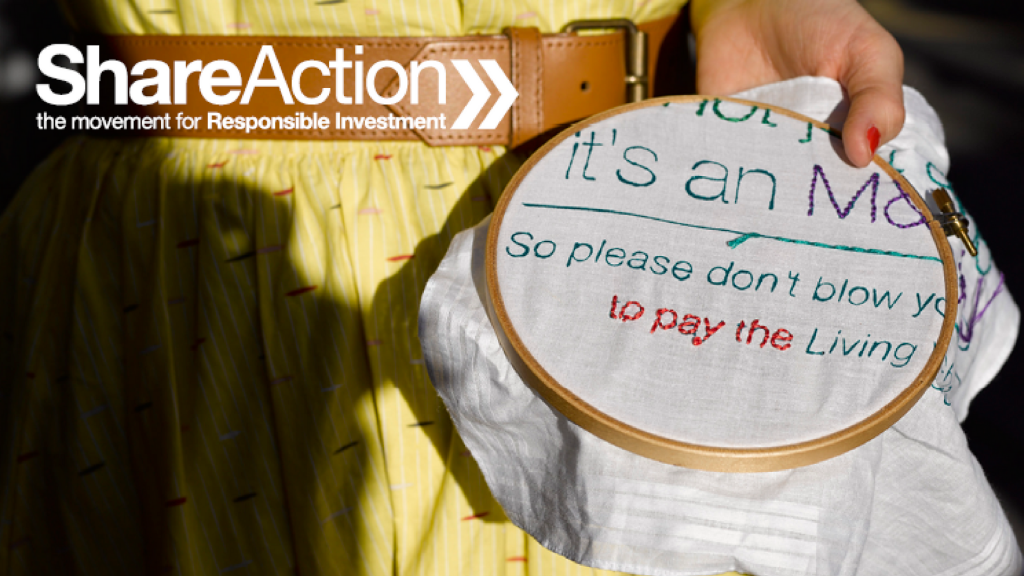ShareAction – Using Investment to Promote the Living Wage
18 September 2018In our latest post, Professor Ed Heery explains one of the defining features of the UK’s Living Wage campaign – its emergence from civil society.
The Living Wage has been developed by civil society organizations – charities and NGOs – that seek to promote good labour standards and have them adopted by employers. One such organization that has played a prominent part in the campaign for the Living Wage is ShareAction.
ShareAction is a campaigning charity, which exists “to make investment a source for good” and makes use of shareholder activism to encourage responsible behaviour by large, listed companies. It is a striking example of what are sometimes described as new employment actors (Heery and Frege 2006); that is, civil society organizations that seek to advance the interests of working people using methods that differ from reliance on collective bargaining and employment law that has long characterised the traditional labour movement.
Behaving ethically
ShareAction was founded in the late 1990s and emerged from a campaign to encourage the Universities Superannuation Scheme to divest from arms manufacture. In its early years, campaigning activity was directed at the investment decisions of pension schemes but since then ShareAction has developed a broad, three-pronged strategy to promote responsible investment.
One element of this strategy involves lobbying for the reform of the investment system to make it easier for both investors and the companies they invest in to make ethical decisions. A second element involves promoting investor activism, particularly amongst small shareholders.

This work involves training activists and coordinating social media and other campaign activity to exert pressure on large businesses to behave ethically. The final element of the strategy involves running campaigns on particular issues, in which the Annual General Meetings of large corporates are targeted with appeals to adopt ethical policies.
These issue-based campaigns address a broad range of business activity. One major current focus is on environmental sustainability, with separate campaigns directed at banking and the fossil fuel industry to encourage transition to a low-carbon economy. ShareAction also campaigns on social sustainability and has promoted greater transparency in global supply chains via its Workforce Disclosure Initiative.
“It is one of a phalanx of campaigning organizations encouraging UK-based multinationals to assume greater responsibility for working conditions within their supply chains.”
The Living Wage campaign is part of this initiative to encourage social sustainability. ShareAction’s objective is that all members of the FTSE100 will pay their UK-based employees the ‘real’ Living Wage, an hourly rate of pay calculated by the Living Wage Foundation designed to provide low-wage workers with a modest but decent standard of living. It campaigns for FTSE100 businesses to become formally accredited by the Foundation as Living Wage Employers, guaranteeing the Living Wage not only to direct employees but to the employees of contractors who are permanently located within their businesses, such as cleaning, catering and security staff.
Campaigns, craftivism and calls for action
The methods used by ShareAction to promote the Living Wage are typical of its campaigning repertoire. One element targets institutional investors and ShareAction produces regular Investor Briefings on the Living Wage that explain what it is and make a business case for its adoption. It has also created a permanent network of investors who are committed to the Living Wage and which themselves encourage its adoption in the companies in which they invest. When an individual member of the FTSE100 is the focus of a campaign, this group of investors will write collectively to the CEO calling for the business to become an accredited Living Wage Employer.

A second method is to use public campaigning to put pressure on leading businesses, typically in the period running up to the annual shareholder meeting.
“One of the most notable of these campaigns was carried out jointly with the Craftivist Collective in 2015. The target on this occasion was Marks & Spencer’s and the campaign organized a series of ‘stitch-ins’ at M&S stores at which M&S handkerchiefs were embroidered with calls for the business to adopt the Living Wage.”
These handkerchiefs were then presented to members of the M&S board, to leading shareholders and to celebrities involved in M&S advertising. More recently, housebuilder Persimmon has been targeted through an on-line petition decrying an enormous salary award to its Chief Executive, which points out the award could fund payment of the Living Wage to a total of 4,100 UK workers.
The final method, which defines ShareAction’s modus operandi, is to have a presence at the annual shareholders’ meeting of FTSE100 companies at which resolutions can be submitted, which raise the question of the Living Wage and call for action from the company’s board. ShareAction holds shares in all of the UK’s leading companies, enabling it to have a presence at shareholder meetings and it has developed a network of activist investors, who may also be employees of FTSE100 firms, which it trains to ask questions and submit resolutions at company AGMs.
A key objective of interventions of this kind is to secure a meeting with senior management to discuss Living Wage accreditation. Often the Living Wage Foundation, the accrediting body, will be involved in these meetings and at this point ShareAction will hand over to its sister-NGO which will oversee the process of Living Wage implementation.
“More than 30 FTSE100 companies have become accredited as Living Wage Employers following intervention by ShareAction at shareholder meetings, with Croda International, Diageo, Informa, Ashtead Group and WPP becoming accredited in the last 12 months.”
A positive relationship with business
Underpinning this seemingly successful approach to Living Wage campaigning are two organizing principles. First, ShareAction is a networking organization. It builds and coordinates networks of investors and shareholders and works in partnership with a broad range of other campaigning bodies to achieve its objectives. Its joint activity with the Living Wage Foundation is exemplary in this regard but the same kind of partnership can be seen in other aspects of ShareAction’s work. It is a form of action that often characterizes new employment actors of this type.
Second, ShareAction campaigns in a “non-aggressive” manner. Although its public campaigning may embarrass executives and expose corporate failure, the purpose is always to use investor influence to develop a positive relationship with business. The ultimate aim is to persuade executives to buy-in to the campaign objectives that ShareAction is promoting.
ShareAction therefore is emphatically not an anti-capitalist organization. On the contrary, its work is founded on the belief that the investment system is reformable and that investor pressure can be used to promote more sustainable forms of business activity. Again, this is a common feature of new employment actors – they are often critical of business but seek to persuade corporations that acting in a manner that is ‘sustainable’ is beneficial to business in the longer term.
ShareAction, like many other campaigning bodies of this type, believes that there is scope to identify common interests with business, common interests that embody the public good.
Ed Heery is Professor of Employment Relations at Cardiff Business School. His research with colleagues Drs Deborah Hann and Dave Nash focuses on the implementation of the Living Wage in the UK. If you would like to read the findings from this research, please follow the links below:
Heery et al. (2017) The Living Wage campaign in the UK, Employee Relations
Heery et al (2017) The Living Wage – Employer Experience
Heery et al (2018) Employers and the Real Living Wage: Responding to Civil Regulation
Reference
Heery, E. and Frege, C. (2006). ‘New actors in Industrial Relations’, British Journal of Industrial Relations, 44/1: 6-1-4.
Comments
1 comment
Comments are closed.
- March 2024
- April 2023
- August 2022
- July 2022
- April 2022
- March 2022
- February 2022
- December 2021
- October 2021
- September 2021
- May 2021
- April 2021
- March 2021
- February 2021
- January 2021
- December 2020
- November 2020
- October 2020
- September 2020
- August 2020
- July 2020
- June 2020
- May 2020
- April 2020
- March 2020
- February 2020
- January 2020
- November 2019
- October 2019
- September 2019
- August 2019
- July 2019
- June 2019
- May 2019
- April 2019
- March 2019
- February 2019
- January 2019
- December 2018
- November 2018
- October 2018
- September 2018


Great post!